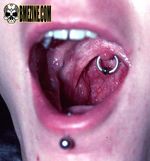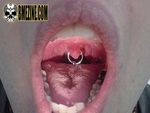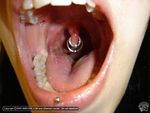Uvula piercing
An uvula piercing is a piercing of the uvula (the little punching bag shaped flesh at the start of the throat). At first, it was extremely rare, but these days, it's been done by hundreds of piercers.
Contents
- 1 Placement
- 2 Purpose
- 3 Procedure
- 4 Jewelry
- 5 Healing and aftercare
- 6 History and culture
- 7 Health issuses
- 8 Risks
Placement
It is important that the piercing be placed as high up as possible on the uvula since migration can be a serious problem. In addition, a lower placement can be difficult to "show off" in some individuals.
Purpose
The uvula piercing has no functional or obviously aesthetic purpose. While some people have gotten the piercing as a "stupid human trick" to show off how "elite" they are or simply to have a very rare piercing, Jon Cobb explains:
- "There had [to be] the fundamental drive for getting it in the first place. If it's a stupid human trick, I'll leave that to Letterman. I was driven to have the uvula because it reflected the mind. When you put a pair of forceps on a uvula, it feels like you've grabbed the center of the mass of the inside of your head — if you cough up a piece of rice and it sits in the back of your sinus passage, you understand that spot. Psychologically, it feels like you're getting the center of your head pierced. That is so live, so real, and the risk inherant only added to the psychological imperative, and I was just driven to have it. Again, not a rational action, but that's not the point. The technical aspects were just a neccesity, but of course I tweaked and got into that. But it was never the motivation. It was never enough. Do you need it? Is it supposed to be there? Yes, then we're going for it."
Procedure
Doing the piercing is not dangerous if done by an expert piercer, with a strong emphasis on the word "expert." With planning and steady hands, this piercing can be performed with an acceptably low level of risk. It is also very important that the piercee (rather than the piercer) be an expert — They need to be able to stay calm through any problems (difficulty in follow-through, etc.), and avoid gagging at all costs. Assuming that the piercee can remain still, a properly planned procedure bears little risk. However, if the piercee gags violently, it could be possible to drop the needle or the jewelry, or pierce the side of the throat. With adequate "dry runs" the chances of this can be reduced to a minimum.
In most cases the piercing is done with a hollow needle (a normal piercing needle) in a standard clamp and pierce fashion, with slight modifications to tools and procedure for safety. In other cases, the piercing has been done using a solid (suture) needle. The most difficult part about the piercing procedure tends to be the follow-through, as the uvula grips anything passing through it. Finally, the piercee may wish to rinse and gargle with an oral xylocaine to numb the inside of the mouth and hopefully eliminate all gag reflexes.
Jewelry
The uvula piercing is usually done with a captive bead or fixed bead ring in 14ga (although 16ga and 12ga have been used successfully). Circular barbells and straight barbells can also be used. The piercing is almost always done across the uvula, but front-to-back piercings are not unheard of.
Healing and aftercare
Healing from this piercing is quite fast and relatively painless (imagine a mild sore throat), with healing taking less than two weeks. Depending on the individual, it may take some time (a few days to a week) to become fully accustomed to the piercing touching anatomy in the area and there may be occasional accidental gag reflex. The easiest way to overcome this is to tip the head slightly back and make a swallowing motion (or, better yet, have a small drink of water).
The primary difficulty most people have is keeping the piercing free of plaque (which can, in addition to an anti-plaque mouthwash and good oral hygiene, require holding half of the jewelry with forceps and brushing the other half.
History and culture
Contrary to urban legend, this piercing never killed anyone. When Jon Cobb first did this piercing in 1994, an urban legend was spread by several members of large, "respected" piercing studios that a street kid died from having a needle jammed into the side of their throat attempting this piercing, but it is not true. Several other variations of this urban legend have since surfaced. It is likely that the rumor was spread to discredit piercers attempting this difficult piercing.
Health issuses
Surprisingly, a uvula piercing does not get in the way or make you sick all the time. (However, in some cases, the piercing may impair fellatio). For most people, the uvula has very little feeling at all — it's the surrounding tissue that controls the gag reflex. To test this, look in a mirror, and touch your own uvula with a cotton swab or end of a toothbrush, making sure not to touch anything else.
Having the piercing is not dangerous either. Contrary to posts made by members of "official" "professional" associations and "respected" piercing studios, there is no serious risk to having a uvula piercing. As far as damage to the uvula itself, remember that the uvula is not uncommonly removed in some anti-snoring surgeries. As far as the risk of inhaling the jewelry, if this was a real risk, it would have become apparent with tongue piercings (which come undone on a semi-regular basis). Remember that the uvula contracts and changes shape a great deal during swallowing motions. If the piercing comes out, that is when it will (on swallowing rather than breathing).



